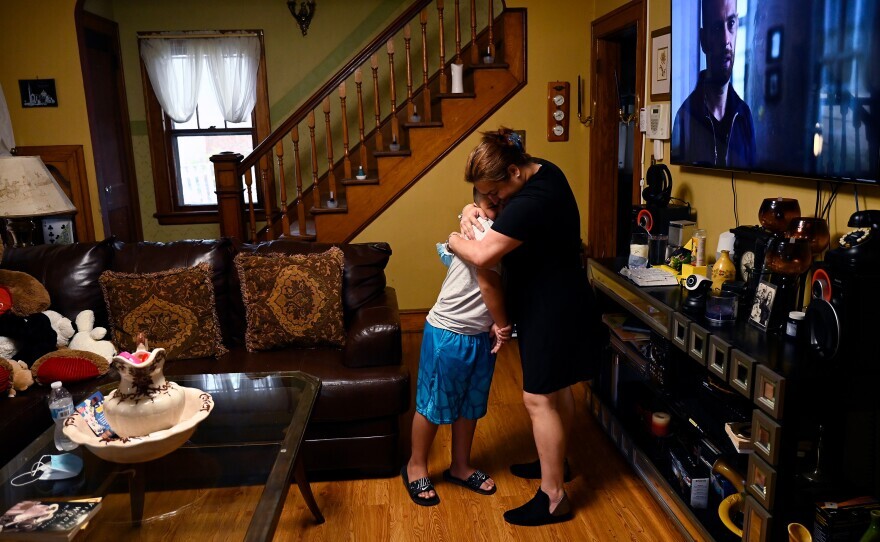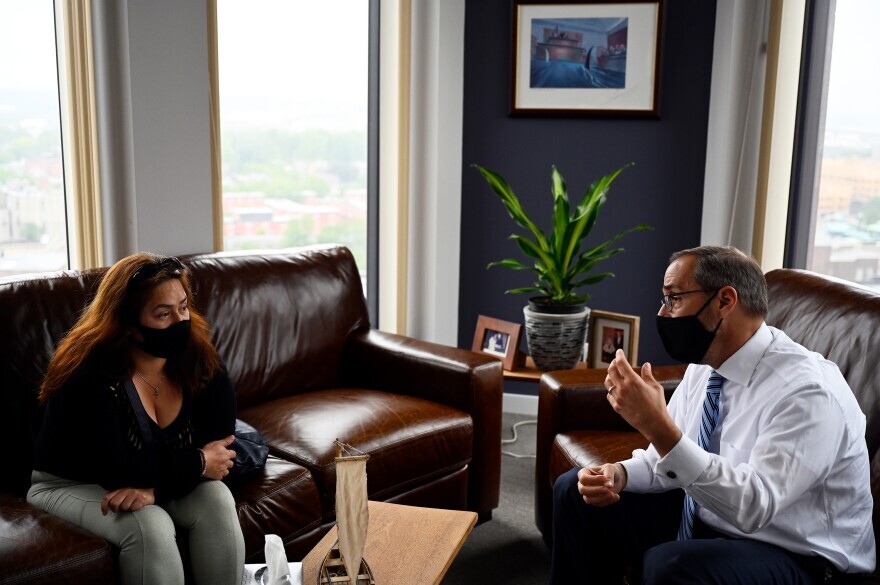Conn. mother waits to hear if she’ll be deported, as new immigration enforcement guidelines take effect

Glenda Cardenas hugs her son, Kenneth Torres, after his conversation with a representative from the Conn. Department of Children and Families during a welfare check at their home in Waterbury, Conn. (Joe Amon/ Connecticut Public)
Glenda Cardenas is worried about her kids. Seated in their living room in Waterbury, she said her son and daughter, 10 and 14 years old, are afraid she’ll leave them. Again.
Speaking in Spanish, Cardenas said the children ask if they’ll be separated next April. Right now, that’s as late as Cardenas can legally stay in the U.S. She said the kids cry and anxiously count the months. They want to know what will happen to them. And though she’s not sure it’s true, she’s promised that she won’t leave them next year and that they won’t be separated.
Cardenas is from San Pedro Sula, one of the most violent cities in Honduras, a country with one of the highest murder rates in the world. In 2005, when she was 24, she crossed the U.S. border undocumented and met and married Miguel Torres, a U.S. citizen from Puerto Rico. They moved to Waterbury with their two children. Cardenas was able to get a work permit and Social Security card.

Glenda Cardenas visits with her attorney, Glenn Formica, at his New Haven office in June. The news wasn’t what she wanted to hear. Her journey to obtain a green card might have only taken months, but the reality is it will probably be a fight that could last years. “It all has to do with the way she was allowed to reenter the country,” Formica said. (Joe Amon/ Connecticut Public)
But things changed in early 2016, when she was told she’d have to start reporting to Immigration and Customs Enforcement. She complied with the ICE orders. She has no criminal record. Still, in 2018, Cardenas was deported to Honduras. Torres, a busy salesman, became a single parent caring for two children profoundly affected by the loss of their mother.
“I remember one time meeting him because we had to talk about Glenda’s case,” said her immigration attorney, Glenn Formica. “I walked him out to the car and in the back his two kids were working on a plywood table that he had made for the back seat doing their homework. And it was probably 9, 9:30 at night.”
After an accident at home earlier this year, Torres was hospitalized, gravely ill. Formica contacted the Department of Homeland Security. He wanted Cardenas to be able to see her husband before he died.

Glenda Cardenas’ daughter, Nathaly Torres, keeps a wedding photo of her mother and her late father, Miguel Torres, in her room. (Joe Amon/ Connecticut Public)
“Glenda received, because of really and I mean extremely dire personal circumstances, a very limited form of relief called ‘humanitarian parole,’” he said. “It’s rare. I mean, it’s unicorn rare.”
Most deportees are barred from returning to the U.S. for 10 years, but Cardenas was allowed back temporarily.
“It was actually a new attorney in Homeland Security who was an empathetic person who got back to me on a Sunday night,” Formica said. “And it was because of her efforts that Glenda was able to fast-track a visa in Honduras.”
Not long after Cardenas returned to Connecticut, Miguel Torres died. Now Cardenas has become a single parent. But her permission to stay runs out in the spring, and her children fear she’ll be deported again.
For the rest of the story, including the audio version, please visit CTPublic.org.
